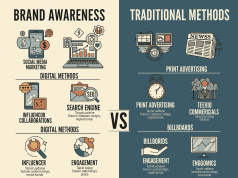In today’s fast-paced digital landscape, data-driven marketing has emerged as a pivotal strategy for brands seeking a competitive edge. Companies that harness the power of data and marketing technology (martech) gain deeper insights into consumer behaviors, preferences, and trends, allowing them to tailor their marketing strategies more effectively. This article explores the significance of data-driven marketing, the role of martech in this evolution, and best practices for leveraging these tools.
The Importance of Data-Driven Marketing
Data-driven marketing revolves around using data to inform decision-making and strategy development. It empowers marketers to:
Understand Customer Behavior: Comprehensive data analysis helps marketers comprehend how customers interact with products and brands across various channels.
Enhance Personalization: By harnessing data, marketers can create personalized experiences, offering tailored products and services that resonate with individual consumers.
Optimize Campaign Performance: Continual monitoring of campaign data allows marketers to refine strategies in real-time, maximizing ROI and minimizing wasted resources.
- Predict Trends: Analyzing historical data can help forecast market trends and customer needs, enabling businesses to be proactive rather than reactive.
The Role of Martech in Data-Driven Marketing
Marketing technology now plays a central role in the execution of data-driven strategies. With a multitude of tools available, organizations can choose technologies that best fit their marketing objectives. Here’s how martech facilitates data-driven marketing:
1. Data Collection and Management
Platforms like Customer Relationship Management (CRM) systems and data management platforms (DMPs) aggregate consumer data from various sources, providing a holistic view. This collection aids in managing consumer interactions and streamlining communication.
2. Analytics and Insights
Tools such as Google Analytics, HubSpot, and Tableau enable marketers to analyze vast amounts of data easily. These platforms provide insights that highlight trends, customer segments, and campaign performance, empowering marketers to make data-informed decisions.
3. Automation
Marketing automation platforms help execute campaigns based on data signals. For example, if a potential customer abandons a shopping cart, automated tools can trigger personalized follow-up emails, thereby increasing the chances of conversion.
4. A/B Testing
A/B testing tools allow businesses to test different marketing strategies in real-time. Marketers can analyze consumer response to various elements—such as email subject lines or landing page designs—to determine what drives engagement and conversion.
5. Attribution Modeling
Understanding which marketing channels contribute most to a conversion is crucial for effective budget allocation. Attribution modeling tools help analyze consumer journeys, ensuring that marketing efforts are directed towards the most effective channels.
Best Practices for Implementing Data-Driven Marketing
Embrace a Data-First Culture
Organizations should foster a culture that values data insights. Training teams in data literacy helps everyone make informed decisions, aligning marketing strategies with overall business objectives.
Ensure Data Quality
High-quality, accurate data is essential for effective marketing. Companies must implement processes to cleanse, validate, and secure data to ensure that insights derived are trustworthy.
Invest in the Right Tools
Choosing the appropriate martech stack is critical. Businesses should assess their specific needs and invest in tools that seamlessly integrate into existing systems, ensuring a smooth data flow.
Focus on Compliance
With growing data privacy regulations, such as GDPR and CCPA, marketers need to ensure compliance in their data collection processes. This will not only protect consumer rights but also build trust and credibility.
Continuously Analyze and Adapt
The marketing landscape is continually evolving. Marketers must regularly analyze performance metrics and adapt strategies to stay relevant and effective.
Conclusion
Data-driven marketing, powered by effective martech solutions, is not just a trend; it is now a necessity for businesses aiming to thrive in a competitive environment. By leveraging data to gain insights into consumer behavior, enhance personalization, and optimize campaigns, organizations can create impactful marketing strategies that resonate with their target audiences. As technology continues to advance, those who commit to data-driven marketing will remain at the forefront, leading with confidence and innovation.









